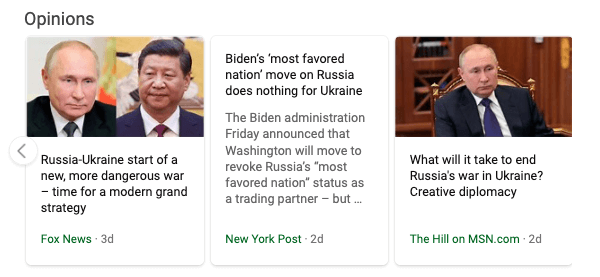Microsoft Bing’s search results for queries related to the conflict in Ukraine show an Opinions section and two timelines (one in the main column and another in the knowledge panel).
The Opinions section. On Bing, news results typically appear in the “News about” section (at the top of the example above; this feature is similar to Google’s Top stories section) or in the standard, non-rich result listings.
However, media outlets often publish opinions and commentary on current events from non-staff writers. Bing has started highlighting these types of results in their own section, “Opinions.”

For the query [Ukraine Russia], the Opinions section included six results from different media outlets. When a featured image isn’t available, Bing will show a preview of the article (as shown above).
The timelines. For associated queries, Bing may show up to two timelines: the horizontal timeline that appears in the main column of search results and the vertically oriented timeline within the knowledge panel (on the right-hand rail of the search results).
The timeline within the knowledge panel begins on August 24, 1991, when Ukraine became an independent state following the dissolution of the Soviet Union, and includes prior events, such as the annexation of Crimea, that have led to the current state of Russo-Ukrainian affairs.
The horizontal timeline in the main column only shows events from February 9 until March 5 (the screenshot below was taken on March 14).

Additionally, the main column timeline cites sources, whereas the knowledge panel timeline does not.
Why we care. The Opinions section may help Bing contextualize some news-related results for users. Informing users that a result is an opinion (and not strictly news) helps them understand the nature of the content, thus potentially reducing misinformation.
Likewise, the timeline features may help users understand how an event has unfolded, which may also help them make sense of the content on that same search results page. For example, if a timeline were present on coronavirus-related search results, it might provide a frame of reference for users, enabling them to better interpret the number of daily new cases or understand whether restrictions are being loosened or heightened.
The visibility opportunities associated with these features are primarily for news publishers, but as was the case with Google’s COVID-related search results page, these features may eventually receive a wider rollout, which could open up opportunities for brands as well.
New on Search Engine Land


